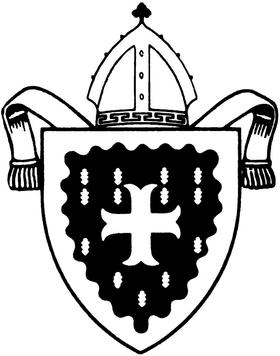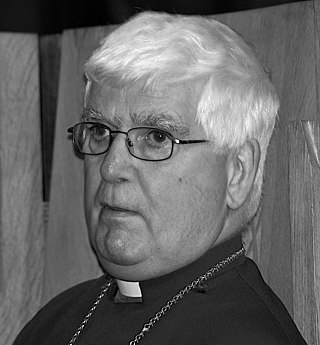
The Anglican Communion is the third largest Christian communion after the Roman Catholic and Eastern Orthodox churches. Founded in 1867 in London, the communion has more than 85 million members within the Church of England and other autocephalous national and regional churches in full communion. The traditional origins of Anglican doctrine are summarised in the Thirty-nine Articles (1571). The Archbishop of Canterbury in England acts as a focus of unity, recognised as primus inter pares, but does not exercise authority in Anglican provinces outside of the Church of England. Most, but not all, member churches of the communion are the historic national or regional Anglican churches.

The Lambeth Conference is a decennial assembly of bishops of the Anglican Communion convened by the Archbishop of Canterbury. The first such conference took place at Lambeth in 1867.

The Church of Nigeria is the Anglican church in Nigeria. It is the second-largest province in the Anglican Communion, as measured by baptised membership, after the Church of England. As of 2016 it gives its membership as "over 18 million", out of a total Nigerian population of 190 million. It is "effectively the largest province in the Communion." As measured by active membership, the Church of Nigeria has nearly 2 million active baptised members. According to a study published by Cambridge University Press in the Journal of Anglican Studies, there are between 4.94 and 11.74 million Anglicans in Nigeria. The Church of Nigeria is the largest Anglican province on the continent of Africa, accounting for 41.7% of Anglicans in Sub-Saharan Africa, and is "probably the first [largest within the Anglican Communion] in terms of active members."

Since the 1990s, the Anglican Communion has struggled with controversy regarding homosexuality in the church. In 1998, the 13th Lambeth Conference of Anglican bishops passed a resolution "rejecting homosexual practice as incompatible with Scripture". However, this is not legally binding. "Like all Lambeth Conference resolutions, it is not legally binding on all provinces of the Communion, including the Church of England, though it commends an essential and persuasive view of the attitude of the Communion." "Anglican national churches in Brazil, South Africa, South India, New Zealand and Canada have taken steps toward approving and celebrating same-sex relationships amid strong resistance among other national churches within the 80 million-member global body. The Episcopal Church in the U.S. has allowed same-sex marriage since 2015, and the Scottish Episcopal Church has allowed same-sex marriage since 2017." "Church of England clergy have appeared to signal support for gay marriage after they rejected a bishops' report which said that only a man and woman could marry in church." The Church of England's 2019 General Synod was set to discuss a diocesan motion "to create a set of formal services and prayers to bless those who have had a same-sex marriage or civil partnership". At General Synod in 2019, the Church of England announced that same-gender couples may remain married and recognised as married after one spouse experiences a gender transition provided that the spouses identified as opposite genders at the time of the marriage.

The Anglican Church of Korea is the province of the Anglican Communion in North and South Korea. Founded in 1889, it has over 120 parish and mission churches with a total membership of roughly 65,000 people.

Thomas Frederick Butler is a British retired Anglican bishop. He was the ninth Anglican Bishop of Southwark. He was enthroned in Southwark Cathedral on 12 September 1998. He retired from this position on 5 March 2010. In 2014, Butler was involved in the transition process for the new Diocese of Leeds as "mentor bishop"; he remains an honorary assistant bishop of that diocese.

The Anglican Consultative Council (ACC) is one of the four "Instruments of Communion" of the Anglican Communion. It was created by a resolution of the 1968 Lambeth Conference. The council, which includes Anglican bishops, other clergy, and laity, meets every two or three years in different parts of the world.

The Anglican Communion Primates' Meetings are regular meetings of the primates in the Anglican Communion, i.e. the principal archbishops or bishops of each ecclesiastical province of the Anglican Communion. There are currently 38 primates of the Anglican Communion. The primates come together from the geographic provinces around the world for discussion and consultation. As primus inter pares of the communion, the Archbishop of Canterbury chairs the meetings, with the Secretary General of the Anglican Consultative Council (ACC) serving as secretary.
Drexel Wellington Gomez is a Bahamian Anglican bishop.
Apostolicae curae is the title of a papal bull, issued in 1896 by Pope Leo XIII, declaring all Anglican ordinations to be "absolutely null and utterly void". The Anglican Communion made no official reply, but the archbishops of Canterbury and York of the Church of England published a response known by its Latin title Saepius officio in 1897.

In 2003, the Lambeth Commission on Communion was appointed by the Anglican Communion to study problems stemming from the consecration of Gene Robinson, the first noncelibate self-identifying gay priest to be ordained as an Anglican bishop, in the Episcopal Church in the United States and the blessing of same-sex unions in the Anglican Diocese of New Westminster. The Commission, chaired by Archbishop Robin Eames, published its findings as the Windsor Report on 18 October 2004. The report recommended a covenant for the Anglican Communion, an idea that did not come to fruition.

The Anglican ministry is both the leadership and agency of Christian service in the Anglican Communion. "Ministry" commonly refers to the office of ordained clergy: the threefold order of bishops, priests and deacons. More accurately, Anglican ministry includes many laypeople who devote themselves to the ministry of the church, either individually or in lower/assisting offices such as lector, acolyte, sub-deacon, Eucharistic minister, cantor, musicians, parish secretary or assistant, warden, vestry member, etc. Ultimately, all baptized members of the church are considered to partake in the ministry of the Body of Christ.
The Bishop of Ebbsfleet is a suffragan bishop who fulfils the role of a provincial episcopal visitor in the Church of England. From its creation in 1994 to 2022, the Bishop of Ebbsfleet served traditionist Anglo-Catholic parishes that could not accept the ordination of women as priests and bishops. From 2023, the bishop will serve conservative evangelical parishes that reject the ordination and/or leadership of women due to complementarian beliefs.
The Anglican realignment is a movement among some Anglicans to align themselves under new or alternative oversight within or outside the Anglican Communion. This movement is primarily active in parts of the Episcopal Church in the United States and the Anglican Church of Canada. Two of the major events that contributed to the movement were the 2002 decision of the Diocese of New Westminster in Canada to authorise a rite of blessing for same-sex unions, and the nomination of two openly gay priests in 2003 to become bishops. Jeffrey John, an openly gay priest with a long-time partner, was appointed to be the next Bishop of Reading in the Church of England and the General Convention of the Episcopal Church ratified the election of Gene Robinson, an openly gay non-celibate man, as Bishop of New Hampshire. Jeffrey John ultimately declined the appointment due to pressure.
The Global Anglican Future Conference (GAFCON) is a series of conferences of conservative Anglican bishops and leaders, the first of which was held in Jerusalem from 22 to 29 June 2008 to address the growing controversy of the divisions in the Anglican Communion, the rise of secularism, as well as concerns with HIV/AIDS and poverty. As a result of the conference, the Jerusalem Declaration was issued and the Global Fellowship of Confessing Anglicans was created. The conference participants also called for the creation of the Anglican Church in North America as an alternative to both the Episcopal Church in the United States and the Anglican Church of Canada, and declared that recognition by the Archbishop of Canterbury is not necessary to Anglican identity.

The ordination of women in the Anglican Communion has been increasingly common in certain provinces since the 1970s. Several provinces, however, and certain dioceses within otherwise ordaining provinces, continue to ordain only men. Disputes over the ordination of women have contributed to the establishment and growth of progressive tendencies, such as the Anglican realignment and Continuing Anglican movements.
The Anglican Group for the Ordination of Women to the Historic Ministry of the Church existed from 1930 to 1978. By research, education, publicity, and memorials to the church, it pushed the Church of England and the whole Anglican Communion to admit women to the historic three-fold ministry. By the time the organization disbanded in 1978, women had been ordained priests in four provinces of the Anglican Communion.

Andrew John Lines is a British Anglican bishop. Since June 2017, he has been the Missionary Bishop to Europe of the Anglican Church in North America (ACNA), a province outside the Anglican Communion. In 2020, he became the first presiding bishop of the Anglican Network in Europe, a "proto-province" recognized by the Global Fellowship of Confessing Anglicans. Since 2000, he has been Mission Director and CEO of Crosslinks. He is also the Chairman of the Executive Committee of the Anglican Mission in England (AMiE), the missionary arm of GAFCON in England. In June 2017, it was announced that he would be made a bishop for ACNA and GAFCON; he was consecrated on 30 June 2017.
The fifteenth Lambeth Conference was an assembly of bishops of the Anglican Communion convened by the archbishop of Canterbury, Justin Welby, between 27 July and 7 August 2022. It was the first Lambeth Conference to be held since 2008.
The Anglican Network in Europe (ANiE) is a small Christian denomination in the Anglican tradition with churches in Europe. Formed as part of the worldwide Anglican realignment, it is a member jurisdiction of the Global Fellowship of Confessing Anglicans (GAFCON) and is under the primatial oversight of the chairman of the GAFCON Primates Council. GAFCON recognizes ANiE as a "proto-province" operating separately from the Church of England, the Scottish Episcopal Church, the Church in Wales and other Anglican Communion jurisdictions in Great Britain and the European continent. ANiE is the body hierarchically above the preexisting Anglican Mission in England; the former is the equivalent of a province whilst the latter is a convocation, the equivalent of a diocese.






